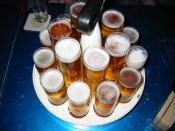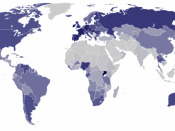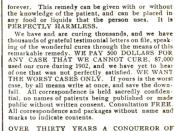Abstract
One large component of American popular culture today is alcohol. A common stereotype for the effects of alcohol is that as a drug it acts as a stress antagonist. This theory was introduced by Conger (1956) as the Tension Reduction Hypothesis (TRW). It states that alcohol's sedative action on the central nervous system serves to reduce tension, and because tension reduction is reinforcing, people drink to escape it (Marlatt & Rehsenow, 1980). Why do we drink, when do we drink, and how much do we drink? This research will determine the correlation between total weekly consumption of alcohol and perceived stress, alcohol outcome expectancies, gender, coping styles, and family history of alcoholism among undergraduate students. Do people drink more or less when stressed? Do alcohol outcome expectancies lead to higher or lower consumption? Is a history of family alcoholism positively or negatively correlated to personal consumption? Do the tested variables play mediating or moderating roles in stress-related drinking? This research will determine the answers to these questions, and determine the strength of the correlations, if any.
Introduction
The main question that this statistical model will answer is as follows: Is there any correlation between drinking and gender, alcohol expectancies, family alcoholism, stress, and coping styles?
Gender
It has been demonstrated that significant differences exist between the drinking patterns of men and women (Hilton, 1988). In a survey of US drinking habits conducted in 1988 by the US National Center for Health Statistics, Dawson and Archer (1992) showed that there are three areas illustrating gender differences. The first is the actual number of male and female drinkers. The study showed that 64% of men versus 41% of women were current drinkers. Second, men were more likely to consume alcohol on a daily basis (17.5 grams of ethanol per day versus...


